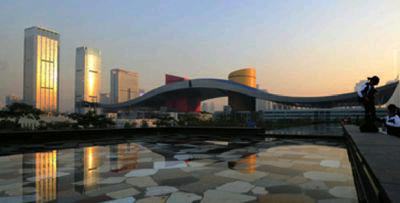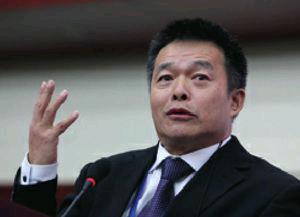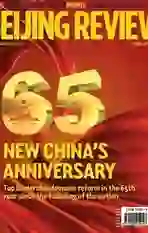Reform for The Modern Age
2014-10-23ByTangYuankai
By+Tang+Yuankai
Before giving a lecture at prestigious Tsinghua University in March, Nobel Prize laureate Joseph E. Stiglitz asked Tsinghua professor Hu Angang two questions: what does the modernization of the national governance system and governance capability mean? And how is it related to Chinas reform?
Stiglitz asked the right person. Professor Hu is a leading researcher in studying Chinas political and economic situation and a prolific author in these fields. He has extensively studied the topic in question, and in collaboration with several young scholars, recently published the results of his research in a book titled The Modernization of Chinese National Governance.
“This book is the first systematic and objective evaluation on Chinas economic reform in the past decade,”said Li Yongqiang, head of China Renmin University Press, publisher of the book, at the books launch ceremony on September 9.
Multiple perspectives
In the new book, Hu attempts to answer several questions: how should the current system of government and its capability be evaluated? How can a country push forward modernization in that area? How does Chinas system stack up against other countries?
Hu has reviewed theories on national modernization, governance and efficiency. “The modernization of the government system and its proficiency is not an imported idea, but a part of Chinas overall push for progress,” Hu said.
Beginning in the 1960s, China launched an initiative to modernize its agriculture, national defense and science and technology industries by the end of the 20th century. Hu said that Chinas national governing system cannot be separated from the countrys history.
He believes that the greatest innovation to come out of China is the creation of a modern national system of rule distinct from Western ones. He said that in the age of agricultural civilization, Emperor Qinshihuang (221-207 B.C.) created an administrative system of prefectures and counties. In the age of industrial civilization,Mao created a country led by the Communist Party of China and the National Peoples Congress. Countries have different national conditions, so every countrys political system is unique and decided by its people, Hu said.
He said that Chinas governing system is remarkable for its capability to innovate and reform itself under different circumstances, and this self-reform mechanism enables Chinese political structure to adapt faster to the changes taking place both at home and abroad.
To test the quality of Chinas system of rule, Hu examined a number of major development indicators from the years 2000 to 2012 for China and the United States, including GDP, healthcare, social security and public security. Through complicated evaluation and comparison, he found that China outperformed the United States in several instances.
For example, World Bank data show that Chinas GDP grew at an average annual rate of 11.1 percent from 2000 to 2012, while that of the United States grew at 1.8 percent. The gap between the per-capita income of the U.S. versus China shrank from 15 times to about five times. Through an analysis of the two countriesdebt-to-GDP ratio, Hu also found that Chinas fiscal policy is more sound and sustainable.
To gauge public order and security, Hu inspected the two countries homicide rates published in the Human Development Reports of the UN development Program. He found that between 2004 and 2011, 4.2 homicides per 100,000 people were reported annually in the United States, while 1.1 were reported in China.
Hu used medical insurance coverage to represent a level of basic social security. He found that the percentage of Chinese citizens without basic medical insurance dropped from 94.3 percent in 2001 to 1 percent in 2012, whereas in the United States, the percentage rose from 13.5 in 2001 to 15.4 in 2012.
In terms of scientific and technological innovation, using data from the World Intellectual Property Organization, Hu found that the number of patent applications in China increased by 23.5 percent annually from 2000 to 2012, while rising by just 5.2 percent in the United States.
Nevertheless, Hu admitted that China is confronted with its own problems, yet he is optimistic about finding future solutions.
Persistent study
Hu said that he has been intrigued by the numerous theories behind the creation of national governing systems for more than 20 years. In May 1993, Hu and Wang Shaoguang, a professor with the Chinese University of Hong Kong, published their Report on Chinas State Capacity. In the book, they concluded that state capacity is the most important precondition for a country to achieve industrialization and modernization. Thus, to improve Chinas state capacity was to improve the Central Governments ability to push forward reform and opening up. They pointed out the basic tasks of Chinas reform were to find political and fiscal systems that suited modern society and the national condition.
Several years later, in 2000, Hu, together with Wang and well-known scholar Zhou Jianming, set up a national governing system study group staffed by researchers in various fields like economics, politics, sociology, international relations and public policy. The group published a book on their findings in 2003, concluding that a countrys modernization includes at least two aspects: economic modernization, that is, the modernization of the agriculture, industry, national defense and science and technology sectors and system modernization whose purpose is to create institutions to ensure good governance and long-term stability.
In 2007, the group translated Governance in China, a book published by the Organization for Economic Cooperation and Development in 2005. In the preface of the Chinese version, Hu wrote that a countrys government is a special type of public good, and the state is its main provider; system building requires not only political will and goals, but also learning, innovation and the ability to execute these things.
These fields of study require a long time commitment, and understanding them cannot be accomplished overnight, Hu said, adding that China should continue to study and explore governing systems so as to best serve the people and the country with this knowledge.
